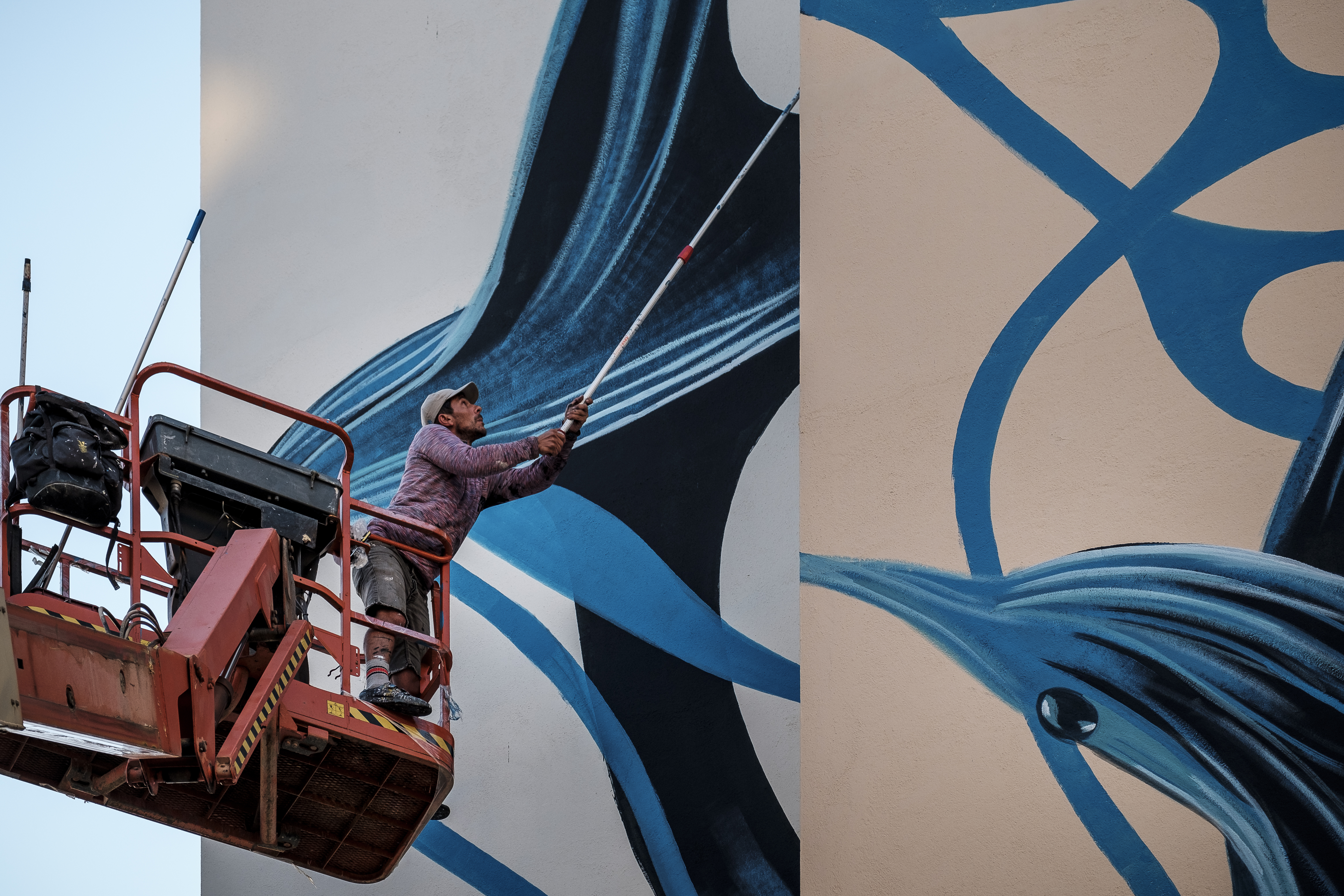BIOGRAFIA

INTERVENÇÕES

PORTFÓLIO


Artur Bordalo
(Lisboa, 1987) is today known as BORDALO II, the artistic name he chose as a
tribute to his grandfather, promoting a continuity and reinvention of his
artistic legacy. His youth was spent in the company of his grandfather, the
painter Real Bordalo and his incessant passion for watercolours, and his
adventures around illegal graffiti in Lisbon’s underworld. He states that the
eight years he spent at the Fine Arts Faculty of Lisbon allowed him to discover
sculpture and the experimentation with various materials which distanced him
from painting, the original art expression which led him there in the first
place.
The public space would become the chosen canvas for his explorations on
colour and scale and the platform where he gradually transformed his habits and
channeled his experiences in construction and development of his artistic work,
currently focused on questioning the materialistic and greedy society which he
(also) belongs to.
The excessive production of “things” or the exaggerated
consumerism, which results in the constant production of “trash” and
consequently in the destruction of our Planet, are the main themes of his
artistic production. That “trash” becomes the singular and peculiar raw
material which he uses in the construction of small or large scale pieces which
he has spread throughout the world and which aim is, above all, to be an
universal manifesto.
BIG TRASH ANIMALS
Big Trash Animals is a series of artworks that aims to draw attention to a current problem that
is likely to be forgotten, become trivial or a necessary evil. The problem involves waste
production, materials that are not reused, pollution and its effect on the planet. The idea is to
depict nature itself, in this case animals, out of materials that are responsible for its destruction.
These works are built with end-of-life materials: the majority found in wastelands, abandoned
factories or randomly and some are obtained from companies that are going through a recycling
process. Damaged bumpers, burnt garbage cans, tires and appliances are just some of the
objects that can be identified when you go into detail. They are camouflaging the result of our
habits with little ecological and social awareness.

FESTIVAL MURO_LX
A água é um recurso escasso e essencial à vida, que deve ser utilizado de forma sustentável sem comprometer as necessidades dos ecossistemas, assim como a qualidade e disponibilidade para uso de gerações futuras. Em Portugal, o consumo de água divide-se em 75% no setor agricultura, 20% no setor urbano e 5% no setor industrial.
O setor da água enfrenta hoje desafios mais complexos e é indissociável do contexto de adaptação às alterações climáticas, sendo por isso fundamental a sua capacidade de resiliência face a fenómenos climatéricos cada vez mais extremos. Os episódios de escassez de água são cada vez mais frequentes e persistentes, sendo evidentes os ciclos de pluviosidade tendencialmente mais curtos. Nos meios urbanos estamos tão habituados à presença e à facilidade de acesso à água, que só damos conta da sua importância quando esta nos faz falta.
Contudo, o uso eficiente de água é hoje imperativo para evitar o desperdício deste precioso recurso, que é uma das bases da sustentabilidade económica, social e ambiental das sociedades.

FESTIVAL MURO_LX
A água é um recurso escasso e essencial à vida, que deve ser utilizado de forma sustentável sem comprometer as necessidades dos ecossistemas, assim como a qualidade e disponibilidade para uso de gerações futuras. Em Portugal, o consumo de água divide-se em 75% no setor agricultura, 20% no setor urbano e 5% no setor industrial.
O setor da água enfrenta hoje desafios mais complexos e é indissociável do contexto de adaptação às alterações climáticas, sendo por isso fundamental a sua capacidade de resiliência face a fenómenos climatéricos cada vez mais extremos. Os episódios de escassez de água são cada vez mais frequentes e persistentes, sendo evidentes os ciclos de pluviosidade tendencialmente mais curtos. Nos meios urbanos estamos tão habituados à presença e à facilidade de acesso à água, que só damos conta da sua importância quando esta nos faz falta.
Contudo, o uso eficiente de água é hoje imperativo para evitar o desperdício deste precioso recurso, que é uma das bases da sustentabilidade económica, social e ambiental das sociedades.

FESTIVAL MURO_LX
A água é um recurso escasso e essencial à vida, que deve ser utilizado de forma sustentável sem comprometer as necessidades dos ecossistemas, assim como a qualidade e disponibilidade para uso de gerações futuras. Em Portugal, o consumo de água divide-se em 75% no setor agricultura, 20% no setor urbano e 5% no setor industrial.
O setor da água enfrenta hoje desafios mais complexos e é indissociável do contexto de adaptação às alterações climáticas, sendo por isso fundamental a sua capacidade de resiliência face a fenómenos climatéricos cada vez mais extremos. Os episódios de escassez de água são cada vez mais frequentes e persistentes, sendo evidentes os ciclos de pluviosidade tendencialmente mais curtos. Nos meios urbanos estamos tão habituados à presença e à facilidade de acesso à água, que só damos conta da sua importância quando esta nos faz falta.
Contudo, o uso eficiente de água é hoje imperativo para evitar o desperdício deste precioso recurso, que é uma das bases da sustentabilidade económica, social e ambiental das sociedades.
Artur Bordalo
(Lisboa, 1987) is today known as BORDALO II, the artistic name he chose as a
tribute to his grandfather, promoting a continuity and reinvention of his
artistic legacy. His youth was spent in the company of his grandfather, the
painter Real Bordalo and his incessant passion for watercolours, and his
adventures around illegal graffiti in Lisbon’s underworld. He states that the
eight years he spent at the Fine Arts Faculty of Lisbon allowed him to discover
sculpture and the experimentation with various materials which distanced him
from painting, the original art expression which led him there in the first
place.
The public space would become the chosen canvas for his explorations on
colour and scale and the platform where he gradually transformed his habits and
channeled his experiences in construction and development of his artistic work,
currently focused on questioning the materialistic and greedy society which he
(also) belongs to.
The excessive production of “things” or the exaggerated
consumerism, which results in the constant production of “trash” and
consequently in the destruction of our Planet, are the main themes of his
artistic production. That “trash” becomes the singular and peculiar raw
material which he uses in the construction of small or large scale pieces which
he has spread throughout the world and which aim is, above all, to be an
universal manifesto.
BIG TRASH ANIMALS
Big Trash Animals is a series of artworks that aims to draw attention to a current problem that
is likely to be forgotten, become trivial or a necessary evil. The problem involves waste
production, materials that are not reused, pollution and its effect on the planet. The idea is to
depict nature itself, in this case animals, out of materials that are responsible for its destruction.
These works are built with end-of-life materials: the majority found in wastelands, abandoned
factories or randomly and some are obtained from companies that are going through a recycling
process. Damaged bumpers, burnt garbage cans, tires and appliances are just some of the
objects that can be identified when you go into detail. They are camouflaging the result of our
habits with little ecological and social awareness.









